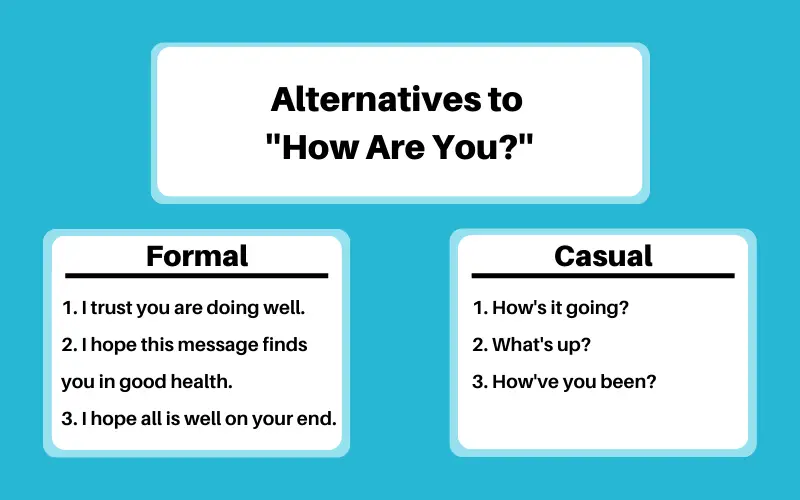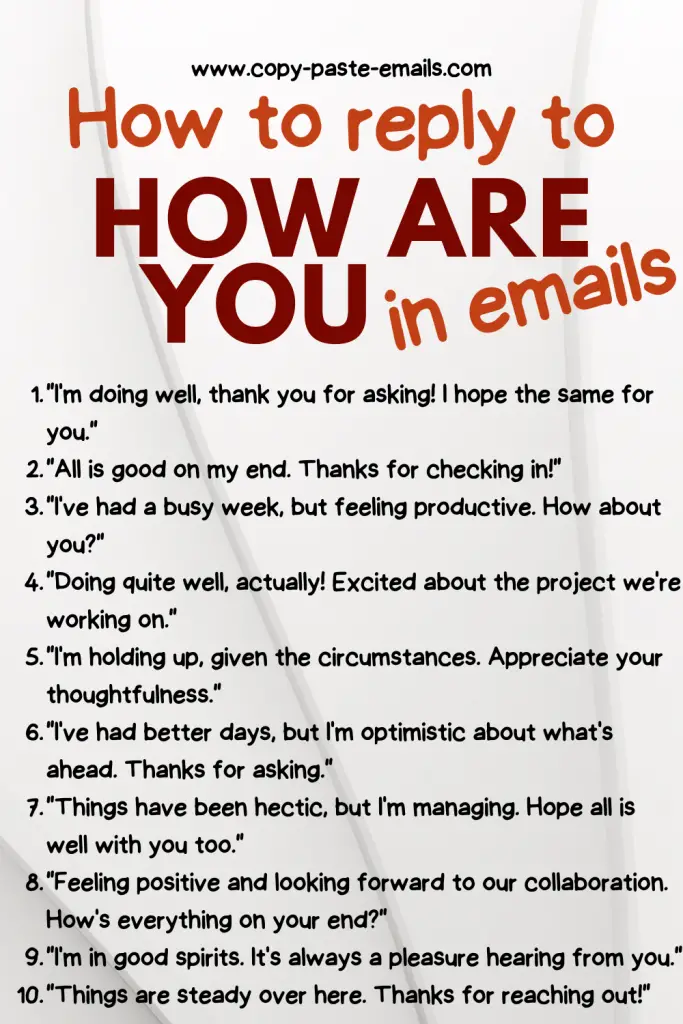“How are you” is a polite way to show the person across from you that you care about them, or more accurately, how they feel. Nowadays it is very often used as a kind of greeting (like “Hello”) and in this case, you are not expected to reply. In this post, you will find out if it is okay to use “How are you” in emails, which alternatives you can replace it with, and what you can reply if you are asked “How are you” in an email.
Is “How Are You” appropriate for emails?
“How are you” can be appropriate in professional emails depending on the context and the relationship between the sender and recipient. When used judiciously, it adds a personal touch and shows concern for the recipient’s well-being. However, for very formal communications or with individuals you’ve never interacted with, it might be best to stick with more conventional greetings.
If you do decide to use “How are you” in your email, here is a sample correspondence:
Email from Jessica:
Subject: Catching Up and Discussing the New Proposal
Hello Noah,
It’s been a while since we last spoke. How are you?
I’ve been going through the recent proposal and had a couple of thoughts I wanted to discuss with you. Firstly, the design aspect is brilliant. However, there are some areas of the budget that I think we might need to review.
Would it be possible to set up a meeting next week to discuss it?
Best regards,
Jessica
Response from Noah:
Subject: Re: Catching Up and Discussing the New Proposal
Hello Jessica,
Thank you for reaching out. I’m doing well, thanks for asking. I hope you’re in good spirits too.
I appreciate your feedback on the proposal. I’m available on Tuesday and Thursday next week. Let’s set up a meeting on one of those days to dive deeper into the budget details.
Look forward to our discussion.
Warm regards,
Noah
When to avoid “How Are You” in emails?
Yes, there are situations where “How are you” might be best avoided. In extremely formal contexts, with higher-ups, you’re not familiar with, or when addressing a group, it might come off as out of place. Additionally, in cross-cultural communications, the phrase might not always translate well or might be perceived differently.
Alternative greetings to “How Are You”
Some alternatives to “How Are You” include “I hope this message finds you well,” “I trust you’re doing well,” “Wishing you a good day,” or those listed below in the picture, or simply starting with “Hello” or “Hi” followed by the main content of the email.

Should you answer to “How Are You” when used in emails?
In a professional setting, while it’s polite to acknowledge the greeting, it’s not always expected for the recipient to provide a detailed response to “How are you.” Often, the phrase might be addressed briefly at the beginning of the reply, but the main focus will be on the primary topic of the email.
But still, if you choose to answer the “How are you” question in an email correspondence, you can use any of these answers:
● “I’m doing well, thank you for asking! I hope the same for you.”
● “All is good on my end. Thanks for checking in!”
● “I’ve had a busy week, but feeling productive. How about you?”
● “Doing quite well, actually! Excited about the project we’re working on.”
● “I’m holding up, given the circumstances. Appreciate your thoughtfulness.”
● “I’ve had better days, but I’m optimistic about what’s ahead. Thanks for asking.”
● “Things have been hectic, but I’m managing. Hope all is well with you too.”
● “Feeling positive and looking forward to our collaboration. How’s everything on your end?”
● “I’m in good spirits. It’s always a pleasure hearing from you.”
● “Things are steady over here. Thanks for reaching out!”

Closing
In general, there’s no harm in using “How are you” in your email, but you should avoid it in more formal correspondence. You might use it when communicating with colleagues or close clients.









